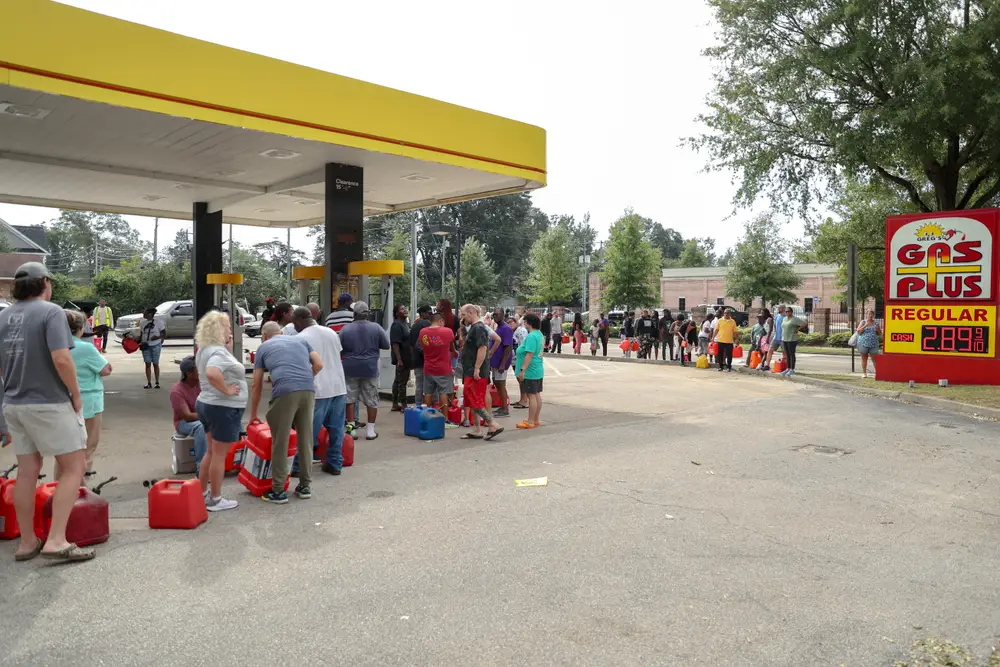America is facing a nightmare scenario with a looming strike and wrecked infrastructure after Hurricane Helene

Residents waited in line at a gas station in North Augusta, South Carolina, on Sunday. Disruptions could grow if dockworkers go on strike.
The US could be entering a hellish period for moving goods around huge swaths of the country.
Hurricane Helene has killed nearly 100 people and left devastation across several states, including widespread flood damage that could leave cities like Asheville, North Carolina, without running water for weeks.
The flooding, plus debris including fallen trees, has made many roads and highways impassable, or at least tricky to traverse, across the southeast.
Now, a looming port strike could also conspire to slow the transport of critical goods and supplies into, out of, and across the US — and, as a result, deal a devastating economic blow.
A strike among dockworkers stretching from the East Coast to the Gulf Coast could start Tuesday. The International Longshoremen’s Association said Sunday it was prepared to strike on October 1. The nation’s largest union of maritime workers is demanding higher wages, among other conditions.
Jon Davis, chief meteorologist at Everstream Analytics, which focuses on supply-chain risk, told B-17 that the storm and the possible strike would have massive “compounding effects.”
“It’s not one plus one equals two. One plus one equals a lot more than that,” he said.
JPMorgan analysts have estimated that costs from shutdowns related to the strike could climb to $5 billion a day.
It would be the first to span an entire US coast since 1977 and would involve ports that account for about half of the country’s ocean shipping. Some 45,000 workers could lay down their metaphorical tools; on top of the catastrophic damage to infrastructure in hard-hit states like Florida, Georgia, and North Carolina, it would undoubtedly slow the movement of critical goods, including food and vehicles.
An inflation driver
Any slowdowns in the US’s critical supply chains could also fan inflation at a time when the Federal Reserve has begun to lower its benchmark interest rate to avoid tipping the economy into a recession. Price increases have cooled year over year, though they remain high for certain goods like eggs, which have spiked because of bird flu.
Amir Mousavian, a professor of supply chain management at the University of New England’s College of Business, said the impact of a strike would depend on how long it lasts but that the potential consequences are substantial.
He told B-17 that perishable goods would be affected almost immediately and that grocery-store shortages could trigger panic buying — akin to what unfolded during the pandemic.
Shipping costs could also jump as businesses seek alternate means of getting goods to customers, such as importing and exporting goods from the West Coast.
“The timing of the strike is especially concerning, as the US economy has seen progress in lowering inflation. A prolonged strike could reverse these gains, forcing the Federal Reserve to reconsider its economic strategy and possibly reintroduce more restrictive measures,” Mousavian said.
A supply chain that’s not resilient
He said the situation is a reminder of what the pandemic starkly revealed — that the US supply chain is “efficient but not resilient.” A walkout would also be a reminder of a need for stronger and more adaptable supply chains to withstand future crises, Mousavian said.
Jason Greer, president of Greer Consulting Inc. and a former agent with the National Labor Relations Board, told B-17 the industrial action is likely to happen and the combination with the hurricane’s aftereffects is “going to be devastating overall.
He said he expects the union will walk out because there is a feeling among members that their concerns haven’t been taken seriously for too long.
“The longshoremen have said, ‘We continue to be pushed aside. We continue to be pushed aside. We’re not going to be pushed aside any longer.’ So I think the overall economic damage is huge,” Greer said, also highlighting impacts like higher grocery prices.
Meantime, Angela Blanchard, Houston’s chief recovery and resilience officer, pointed out on X that the response to and recovery from the hurricane would be “significantly impeded” by a strike. She noted that the disruption at the ports would crimp the availability of materials and fuel — and affect prices.
“This will be a long and complicated recovery season,” Blanchard wrote.






